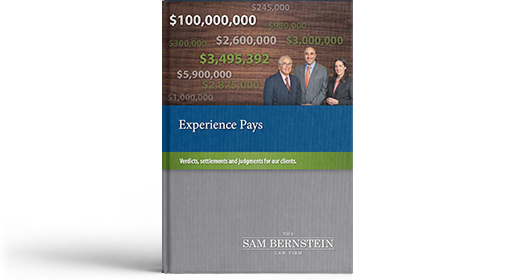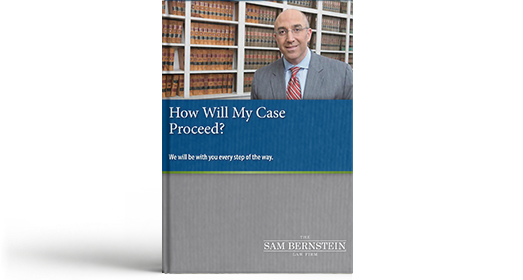Philips CPAP Machine Recall LAWYER
The Sam Bernstein Law Firm is there for you if you or your loved ones have been affected by the Philips CPAP Machine Recall.
USERS OF RECALLED PHILIPS CPAP MACHINES MAY RECEIVE SUBSTANTIAL COMPENSATION
Using a CPAP (Continuous Positive Airway Pressure) or BiPAP machine is one of the most effective ways to alleviate sleep apnea, a condition that can lead to serious health problems if left untreated. However, concerns over potential health risks from foam degradation and possible chemical exposure caused Philips Respironics to recall millions of assisted breathing devices. This massive recall has prompted numerous lawsuits on behalf of individuals experiencing medical problems as a result of these products.
If your health is suffering from using a Philips CPAP machine or other assisted breathing device, you may be entitled to substantial compensation. We can help you get answers and help.
That’s why you should contact us immediately to connect with a member of our highly regarded legal team. We are Michigan's most experienced personal injury law firm with over 800 years of combined legal experience.
Get The Bernstein Advantage® today.
What Are Assisted Breathing Devices and How Are They Used?
Three main categories of mechanical ventilation devices are typically used to treat sleep apnea and other breathing disorders:
A CPAP (continuous positive airway pressure) machine is most commonly used to treat sleep apnea. The device keeps the airway open by providing a continuous flow of oxygen into the nose and mouth through a mask connected to the machine via a tube. The device must be reset to change the air pressure level.
An APAP (automatic positive airflow pressure) machine automatically adjusts the air pressure level to compensate for changes in breathing due to sleep position or other factors.
A BiPAP (bilevel positive airway pressure) machine, also known as BiPAP or BiLevel PAP, has two different air pressure settings, a higher level for inhaling and a lower level for exhaling. BiPAP machines are often used for individuals with higher carbon dioxide levels or those who cannot use a CPAP machine.
Additionally, patients with severe respiratory distress may require a continuous ventilator, which takes over the breathing process by pumping a predetermined amount of oxygen into the lungs.
Submit this simple form for a free consultation now.
Why Were the Philips Devices Recalled?
Specific safety concerns about the sound abatement foam used in numerous devices were first published on April 26, 2021 in Philips’ Quarterly Report. On June 14, 2021, Philips announced a voluntary recall of the affected devices. The FDA identified this as a Class I recall, the most serious kind, stating that “use of these devices may cause serious injuries or death.”
The recall notice states the polyester-based polyurethane (PE-PUR) foam used to make the devices quieter may degrade into particles which may enter the device’s air pathway and be ingested or inhaled by the user. In addition, the foam may release, or “off-gas,” certain chemicals.
Further, the off-gassed chemicals and foam particles may lead to serious or life-threatening injuries such as difficulty breathing (respiratory distress), swelling (inflammation), lack of oxygen (hypoxia), excessive carbon dioxide (hypercarbia) or other toxic reactions.
According to Philips, the foam degradation may be exacerbated by high heat and high humidity environments as well as the use of unapproved cleaning methods such as ozone-based machines.
Contact us today to arrange a free consultation with one of our experienced Philips CPAP Recall attorneys.
Which Philips Assisted Breathing Products Have Been Recalled?
The majority of the affected devices are in the first-generation DreamStation product line.
As of September 10, 2021, the following Philips Respironics products have been recalled:
CPAP and BiPAP Devices
Continuous ventilator, minimum ventilatory support, facility use:
E30
Continuous ventilators, non-life supporting:
DreamStation ASV
DreamStation ST, AVAPS
SystemOne ASV4
C-Series ASV
C-Series S/T and AVAPS
OmniLab Advanced+
Noncontinuous ventilators:
SystemOne (Q-Series)
DreamStation
DreamStation Go
Dorma 400
Dorma 500
REMstar SE Auto
Ventilators
Continuous ventilators:
Trilogy 100
Trilogy 200
Garbin Plus, Aeris, LifeVent
Continuous ventilators, minimum ventilatory support, facility use:
A-Series BiPAP Hybrid A30 (not marketed in U.S.)
A-Series BiPAP V30 Auto
Continuous ventilators, non-life supporting:
A-Series BiPAP A40
A-Series BiPAP A30
For new additions to this list and recent updates about the recall, visit the FDA website.
Contact us today to get started on your Philips CPAP Machine Recall case. The consultation is free!
Philips Announces Additional Recalls for Certain High Flow Therapy Ventilators
Since the original recall, Philips has recalled additional ventilators due to the risk of patients receiving insufficient oxygen when the system pressure reaches a default maximum limit. This issue is unrelated to the risks posed by the PE-PUR foam used in the previously recalled products.
This recall affects Philips Respironics V60 and V60 Plus High Flow Therapy ventilators (Software Versions 3.00 and 3.10)
So far, there have been 61 reported incidents and 25 injuries related to these products, according to information on the FDA website.
What are the Health Risks of Using a Defective CPAP Device?
Cancer is one of the most serious diseases that can result from using a breathing device made with PE-PUR foam. Inhaling or ingesting the decomposing foam particles, in addition to being exposed to toxic off-gassed chemicals, can cause numerous types of cancer. Here are some examples:
- Brain
- Lung
- Breast
- Lymphatic
- Leukemia
- Nasal
- Bladder
- Kidney
- Liver
- Stomach
- Lymphomas
- Hematopoietic/Blood
- Multiple myeloma
- Oral, including palate and tonsils
- Papillary carcinoma
- Rectal
- Testicular
- Thyroid
In addition to cancer, PE-PUR foam degradation and chemical exposure from released gases can cause other conditions and illnesses ranging from mild to severe. What’s more, certain symptoms may also be precursors to more serious disorders.
Below is a partial list of potential adverse conditions that can result from using a Philips assisted breathing device made with PE-PUR foam:
- Headaches
- Inflammation or irritation of the throat or airways
- Breathing difficulties
- Persistent cough
- Chest pressure
- Sinus infections
- Nausea/vomiting
- Asthma, recent or worsening
- Skin or eye irritation
- Adverse effects to other organs such as kidneys and liver
- Diagnosis of cancer or other lung disease
- Respiratory failure
- Pleural effusion
- Liver damage
- Kidney/Renal damage
- Toxic effects from chemical poisoning
Contact your physician immediately if you experience any of the above symptoms or conditions and believe they may be related to a Philips assisted breathing device.
Why Are Certain Products Excluded from the Recall?
According to Philips, the devices that were not recalled have different sound abatement foam materials or designs that place the foam in a location where disintegration is not a factor.
The following devices are not included in the Philips recall:
- Trilogy Evo
- Trilogy Evo OBM
- Trilogy EV300
- Trilogy 202
- A-Series Pro and EFL
- Respironics M-Series REMStar CPAPs, Auto CPAPs, BiPAPs
- DreamStation 2 Auto CPAP Advanced and DreamStation 2 Auto CPAP
- Omnilab and OmniLab Advanced Titration devices
- V60 Ventilator
- V60 Plus Ventilator
- V680 Ventilator
- REMStar SE and Sleep Easy CPAPs
- Dorma 100, Dorma 200 CPAPs (not marketed in US)
- All oxygen concentrators, respiratory drug delivery products and airway clearance products
What Kind of Settlement Can I Expect from a Lawsuit?
As in most areas of the law, each case is different and settlements are determined by a variety of factors. Generally, victims who suffer severe and/or permanent injuries receive more compensation than those who were harmed to a lesser degree.
A person who develops cancer or becomes seriously ill from using a defective product such as the recalled Philips CPAP is usually compensated for two kinds of damages: actual expenses and intangible losses.
Actual expenses include medical care and other related items and services such as nursing care, rehabilitative therapy, in-home assistance and medication. In addition, a defective products settlement typically includes lost wages when victims are unable to work during treatment as well as future income in the case of prolonged or terminal illness. Further, if the patient dies as a result of the faulty product, the survivors may be entitled to additional compensation.
Intangible losses, also known as pain and suffering, are often the largest part of a personal injury settlement. While no one can put a monetary value on a human life, this money compensates victims and their families for the physical and emotional distress caused by the defective product.
What Should I Do if My Philips Device Has Been Recalled?
If you have used or are using one of the recalled devices, contact your physician immediately.
Individuals using life-sustaining ventilators should not discontinue use without consulting their doctor, which should be done right away.
Those using non-life-sustaining assisted breathing machines should stop using the device and contact their physician to discuss alternative treatment methods.
Call an experienced Philips CPAP machine recall lawyer.
We Will Fight to Win the Compensation You Deserve
We believe companies that sell defective products, whether by mistake or by prioritizing profit over safety, should be held accountable to the people they harm. We know each victim has one voice, and challenging a large corporation like Philips can seem daunting. However, with the support of our skilled legal team and vast resources, your voice is amplified until you are heard and rightfully compensated.
Don’t let the legal clock run out. To start your case today, fill out the brief form to the right or call 1-800-CALL-SAM for a free, no-obligation remote consultation from the safety and comfort of your home.
Client reviews

"THEY KEPT ME UPDATED."
- Veronica, Actual Client

"I WILL BE FOREVER GRATEFUL."
- Tim, Actual Client

"I FELT LIKE I WAS A PART OF THE FAMILY"
- Terrence, Actual Client

"VERY PROFESSIONAL & KNOWLEDGEABLE"
- Sherry, Actual Client

"PASSIONATE, COMPETENT, COMMITTED"
- Actual Client

"THEY STAND BY THEIR WORD."
- Actual Client

"KIND & COMPASSIONATE"
- Nancy, Actual Client

"YOU CAN TRUST THEM 100%."
- Michael, Actual Client

"HONEST, CARING, SUPPORTIVE."
- Janice, Actual Client

"THEY TOOK PERSONAL INTEREST IN ME."
- Janice, Actual Client

"I KNEW I WAS IN GOOD HANDS"
- Jerry, Actual Client

"NUMBER ONE PERSON I'D RECOMMEND."
- Actual Client

"SAM'S GOT YOU COVERED."
- Chris, Actual Client



